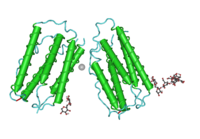
Photo from wikipedia
Background Type I IFN-based therapies against solid malignancies have yielded only limited success. How IFN affects tumor-associated macrophage (TAM) compartment to impact the therapeutic outcomes are not well understood. Methods… Click to show full abstract
Background Type I IFN-based therapies against solid malignancies have yielded only limited success. How IFN affects tumor-associated macrophage (TAM) compartment to impact the therapeutic outcomes are not well understood. Methods The effect of an IFN-inducer poly(I:C) on tumor-infiltrating monocytes and TAMs were analyzed using a transplantable mouse tumor model (LLC). In vitro culture systems were utilized to study the direct actions by poly(I:C)-IFN on differentiating monocytes. Results We found that poly(I:C)-induced IFN targets Ly6C+ monocytes and impedes their transition into TAMs. Such an effect involves miR-155-mediated suppression of M-CSF receptor expression, contributing to restricting tumor growth. Remarkably, further analyses of gene expression profile of IFN-treated differentiating monocytes reveal a strong induction of Arg1 (encoding arginase-1) in addition to other classical IFN targets. Mechanistically, the unexpected Arg1 arm of IFN action is mediated by a prolonged STAT3 signaling in monocytes, in conjunction with elevated macrophage colony-stimulating factor (M-CSF) signaling. Functionally, induction of ARG1 limited the therapeutic effect of IFN, as inhibition of arginase activity could strongly synergize with poly(I:C) to enhance CD8+ T cell responses to thwart tumor growth in mice. Conclusions Taken together, we have uncovered two functionally opposing actions by IFN on the TAM compartment. Our work provides significant new insights on IFN-mediated immunoregulation that may have implications in cancer therapies.
Journal Title: EBioMedicine
Year Published: 2019
Link to full text (if available)
Share on Social Media: Sign Up to like & get
recommendations!